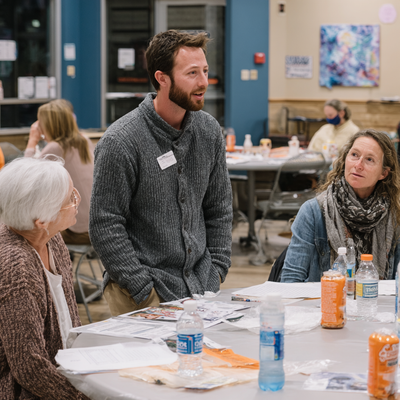Had to tell a volunteer last week that kids were scared of her because she yells when they spill things. That was fun. She cried and I felt like a monster but also those kids shouldn't be terrified of craft time.
These conversations are the worst part of ministry and nobody prepares you for them.
Wait Until You're Not Mad
First time I had to talk to someone about showing up late I was so frustrated I basically attacked them. Went horribly. They quit and told other people I was mean.
Now I wait until I can think straight. Give myself at least a day to cool down and figure out what I actually want to say.
Hard when you're mad though. Want to fix everything immediately but that never works.
Had volunteer who kept changing lesson plans without telling anyone. Kids were confused, other volunteers were confused, I was losing my mind. But waited three days before talking to her and it went way better.
Don't Ambush People
Used to just corner volunteers after church when I was frustrated. Terrible idea. They're tired, other people around, kids hanging on them asking for snacks.
Now I text and ask when they can talk. Give them heads up that we need to discuss something about ministry. Don't say what though or they'll panic for days.
"Hey can we grab coffee sometime this week to chat about Sunday mornings?" Better than springing it on them.
People need time to mentally prepare for serious conversations.
Say Something Good First
Learned this the hard way. Started conversation once with "We need to talk about your attitude with the kids" and volunteer immediately got defensive and stopped listening.
Now I always start with something they do well. "You're so creative with crafts and kids love that. I do need to talk about something though."
Not fake compliments. Real stuff they're good at. Everyone needs to hear good things about themselves.
Makes the hard conversation easier because they know you don't hate them.
Be Specific About Problems
Can't just say "kids don't like you" or "you're too strict." That's not helpful and feels like attack.
"When kids spill things and you raise your voice, they get scared and don't want to participate anymore." Specific behavior, specific impact.
Had volunteer who kept checking her phone during lessons. Couldn't say "you're distracted." Had to say "when you're on your phone while kids are talking, they feel like what they're saying doesn't matter."
Specific examples help people understand what to change.
Don't Make It About Their Character
Easy to say someone is "not good with kids" or "has bad attitude." That's attacking who they are not what they're doing.
Focus on behaviors. "When you..." not "You always..." or "You're the kind of person who..."
Had volunteer who was really impatient. Instead of saying she was impatient person, talked about specific times when she got frustrated and how it affected kids.
People can change behaviors. Can't change who they are as people.
Listen to Their Side
Usually there's more to story than what you see. Maybe they're dealing with stuff you don't know about.
Volunteer who kept missing volunteer meetings was going through divorce. Didn't know until I asked why it was hard for her to make meetings.
Another one who seemed grumpy all time had kid with learning disabilities and was stressed about everything.
Not excuses but helps you understand and figure out solutions together.
Suggest Solutions Together
Don't just point out problems and walk away. Work together to fix things.
"What do you think would help you remember to show up on time?" Let them come up with ideas first.
Sometimes their solutions are better than anything you would have thought of.
Volunteer who kept forgetting supplies started setting phone reminders. Worked perfectly and was her idea.
Know When to Let People Go
Hardest part. Some conversations don't fix anything and you have to ask people to step down.
Had volunteer who kept undermining other volunteers in front of kids. Talked to her three times. Nothing changed. Finally had to ask her to take break from ministry.
She was mad and told people I was power hungry but kids ministry got way better without the drama.
Not everyone is cut out for working with kids. That's okay but you can't let them stay and make everyone miserable.
Follow Up Later
Don't have hard conversation and then pretend it never happened. Check in later to see how things are going.
"How are you feeling about Sunday mornings since we talked?" Shows you care about them not just the problem.
Sometimes need multiple conversations to really fix things. First one just opens the door.
Random Stuff I've Learned
Text is terrible for anything serious. Always talk face to face or at least phone call.
Don't have these conversations when you're rushing to get somewhere. Need time to really listen.
Some people cry no matter what. Have tissues ready and don't panic.
Others get angry and defensive. Stay calm and stick to facts.
Writing down main points helps you stay focused and not forget important stuff.
Meeting somewhere neutral like coffee shop sometimes works better than church building.
Creating regular opportunities for open communication before issues become major problems can help a lot. Resources like Volunteer Discussion Groups can give you structured ways to facilitate team conversations and address concerns before they turn into crisis situations.
What Usually Goes Wrong
Waiting too long to address problems. They get worse and you get more frustrated.
Being too vague about what needs to change. People can't fix things if they don't understand what's wrong.
Making it personal attack instead of behavior issue.
Not listening to their perspective. Maybe there's stuff you don't know.
Expecting immediate change. Some things take time to improve.
Having conversation when you're emotional. Never goes well.
Why It's So Hard
These are volunteers. They're helping for free and you're criticizing them. Feels ungrateful.
Most volunteers have good hearts even when they're doing things wrong. Don't want to hurt people who are trying to help.
Scared they'll quit and you'll be stuck doing everything yourself.
Ministry relationships are complicated. They're not employees but they're not just friends either.
What Actually Works
Being honest but kind. People respect directness when it comes from place of caring.
Focusing on impact on kids not what you personally don't like.
Giving people chance to explain their side before jumping to conclusions.
Working together on solutions instead of just giving orders.
Following up to make sure things are actually getting better.
When It Goes Well
Had volunteer who was always interrupting other people during lessons. Talked to her about letting others finish speaking. She didn't realize she was doing it and worked hard to change. Now she's one of our best team leaders.
Another one kept bringing her own snacks and kids would ignore lesson to ask for food. Talked about saving snacks for after lesson. She understood immediately and problem was solved.
Most people want to do well. Just need to know what that looks like.
When It Doesn't Work
Some people don't think they need to change anything. Had volunteer who thought kids should just sit still and listen quietly for forty-five minutes. Couldn't convince her that wasn't realistic for five-year-olds.
Others agree during conversation but nothing actually changes. Sometimes need to have same conversation multiple times.
Few people get offended no matter how nice you are about it. Take it personally even when you focus on behaviors.
The Worst Part
Knowing you need to have conversation but putting it off because you don't want to deal with drama.
But problems don't fix themselves. Actually get worse when you ignore them.
Kids deserve better than adults who are making their experience worse.
Random Thoughts
These conversations are never fun but they get easier with practice.
Most volunteers really do want what's best for kids. Just need guidance sometimes.
Your job is protecting kids and creating good environment for everyone. Sometimes that means difficult conversations.
People usually respect you more after honest conversation even if it's uncomfortable.
Avoiding problems doesn't make them go away. Just makes them bigger.
Why You Have to Do It
Kids are watching how adults treat each other. They learn from what they see.
Other volunteers get frustrated when problem people aren't addressed. Good volunteers might quit if you don't deal with difficult ones.
Ministry suffers when people aren't doing their jobs well. Kids don't learn and families don't want to come back.
You're responsible for creating environment where everyone can succeed.
Getting Better at It
Practice makes it easier but still never fun.
Think about what you want to accomplish before you start talking.
Focus on behaviors you can observe not attitudes you think you see.
Remember you're doing this for kids not because you like confrontation.
Most people are reasonable when approached with respect and specific examples.
The Goal
Not to make people feel bad or show them who's boss. Goal is better ministry for kids.
When conversations go well everyone wins. Volunteer improves, kids have better experience, ministry gets stronger.
Worth the discomfort to get there.
Sometimes hardest conversations lead to biggest improvements in your program.
Don't avoid them just because they're uncomfortable. Kids are counting on you to make sure their leaders are helping not hurting their experience.








